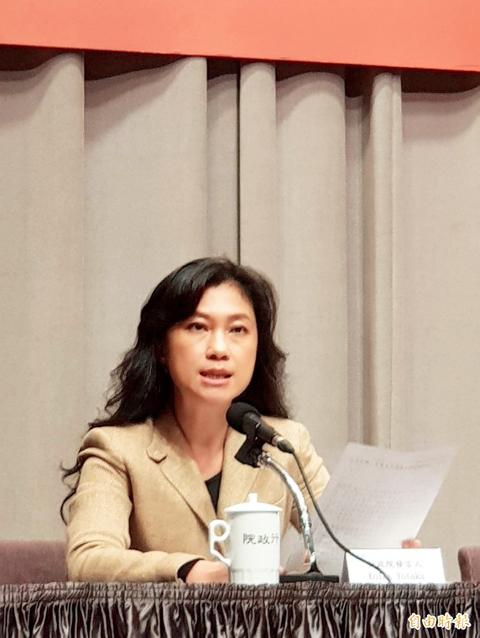Premier Su Tseng-chang (蘇貞昌) yesterday said that he would approve a pilot scheme to offer rent subsidies to single people, newlyweds and families with children younger than 20 who earn less than 2.5 times the government-specified lowest cost of living.
The scheme, aimed at encouraging marriage and childbirth, would benefit 24,000 single men and women, couples or families, Su said while presiding over an Executive Yuan meeting in Taipei.
Applications would be accepted from September, he said.

Photo: Taipei Times
The subsidies would target single men and women between 20 and 40, couples who have been married less than two years and couples with children under the age of 20, Deputy Minister of the Interior Hua Ching-chun (花敬群) told reporters after the meeting.
Under the scheme, which was proposed by the Ministry of the Interior, couples would receive NT$3,000 to NT$5,000 (US$96 to US$160) and individuals would receive NT$2,600 to NT$4,000 in rent subsidies per month depending on the city or county in which they live, he said.
Qualified applicants in Taipei would receive the highest amount, with couples to receive NT$5,000 per month and individuals to receive NT$4,000, he said.
In Taichung, New Taipei City, Taoyuan and Hsinchu, couples and individuals could expect monthly subsidies of NT$4,000 and NT$3,200 respectively; those in Tainan and Kaohsiung would receive NT$3,200 and NT$2,600; and recipients in all other cities and counties could expect NT$3,000 and NT$2,600, he said.
Whereas only individuals who earn less than 1.5 times the lowest cost of living are eligible for an existing rent subsidy scheme, the new scheme would accept applicants who earn less than 2.5 times the lowest cost of living per month per person, he said.
In other terms, families with annual household incomes in the lowest 35th percentile — instead of the lowest 20th percentile — would be eligible, he added.
Using Taipei and New Taipei City as examples, he said that people who earn less than NT$41,450 and NT$36,665 per month on average respectively would be eligible.
Subsidies would be distributed starting in November, he said, adding that the scheme, which is expected to run for one year, would cost about NT$1.1 billion.
The lowest cost of living in Taipei and New Taipei City were set at NT$16,580 and NT$14,666 respectively this year, while the national average — excluding Kinmen and Lienchiang counties — is NT$12,388, according to the Department of Social Assistance and Social Work’s Web site.
Also at the meeting, Minister of the Interior Hsu Kuo-yung (徐國勇) reported on the progress of a plan to build 200,000 social housing units in eight years.
More than 27,000 units have been completed or are under construction, with the number expected to rise to 35,000 by the end of this year and surpass a first-stage target of 40,000 by the end of next year, he said.
Through collaboration with local governments, the central government is confident that it would reach its goal on schedule, he added.

CHANGING LANDSCAPE: Many of the part-time programs for educators were no longer needed, as many teachers obtain a graduate degree before joining the workforce, experts said Taiwanese universities this year canceled 86 programs, Ministry of Education data showed, with educators attributing the closures to the nation’s low birthrate as well as shifting trends. Fifty-three of the shuttered programs were part-time postgraduate degree programs, about 62 percent of the total, the most in the past five years, the data showed. National Taiwan Normal University (NTNU) discontinued the most part-time master’s programs, at 16: chemistry, life science, earth science, physics, fine arts, music, special education, health promotion and health education, educational psychology and counseling, education, design, Chinese as a second language, library and information sciences, mechatronics engineering, history, physical education

The High Prosecutors’ Office yesterday withdrew an appeal against the acquittal of a former bank manager 22 years after his death, marking Taiwan’s first instance of prosecutors rendering posthumous justice to a wrongfully convicted defendant. Chu Ching-en (諸慶恩) — formerly a manager at the Taipei branch of BNP Paribas — was in 1999 accused by Weng Mao-chung (翁茂鍾), then-president of Chia Her Industrial Co, of forging a request for a fixed deposit of US$10 million by I-Hwa Industrial Co, a subsidiary of Chia Her, which was used as collateral. Chu was ruled not guilty in the first trial, but was found guilty

Taiwan-based publisher Li Yanhe (李延賀) has been sentenced to three years in prison, fined 50,000 yuan (US$6,890) in personal assets and deprived political rights for one year for “inciting secession” in China, China's Taiwan Affairs Office spokesman Chen Binhua (陳斌華) said today. The Shanghai First Intermediate People’s Court announced the verdict on Feb. 17, Chen said. The trial was conducted lawfully, and in an open and fair manner, he said, adding that the verdict has since come into legal effect. The defendant reportedly admitted guilt and would appeal within the statutory appeal period, he said, adding that the defendant and his family have

DEADLOCK: As the commission is unable to forum a quorum to review license renewal applications, the channel operators are not at fault and can air past their license date The National Communications Commission (NCC) yesterday said that the Public Television Service (PTS) and 36 other television and radio broadcasters could continue airing, despite the commission’s inability to meet a quorum to review their license renewal applications. The licenses of PTS and the other channels are set to expire between this month and June. The National Communications Commission Organization Act (國家通訊傳播委員會組織法) stipulates that the commission must meet the mandated quorum of four to hold a valid meeting. The seven-member commission currently has only three commissioners. “We have informed the channel operators of the progress we have made in reviewing their license renewal applications, and